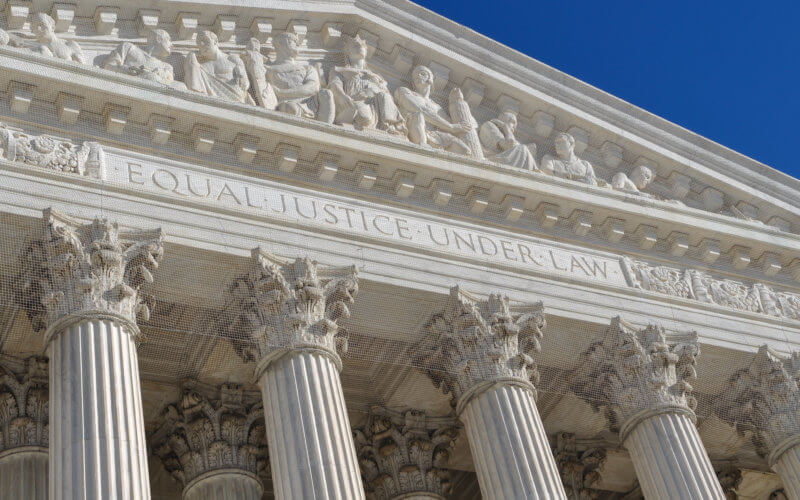
When a draft copy of an upcoming Supreme Court decision that appeared to overturn Roe v. Wade was leaked, it set off a firestorm of controversy.
Concerns were raised over what this would mean not only for the hundreds of thousands of women who seek abortions each year but also for court decisions (same sex marriage, access to contraceptives, privacy laws) that were predicated on the Roe v. Wade ruling.
Pam Fiber-Ostrow, a Cal State Fullerton professor of political science, described the implications of overturning Roe v. Wade in a recent panel discussion on campus that focused on the 2022 U.S. Supreme Court and the groundbreaking legal issues they will be addressing.
What has happened in the almost 50 years since Roe v. Wade legalized abortion?
When Roe v. Wade legalized abortion in 1973, it was based on the 14th Amendment’s concept of personal liberty and restrictions upon state action. It was broad enough to encompass a woman’s decision whether or not to terminate her pregnancy. There were also significant provisions related to privacy between a pregnant woman and her physician as well as other privacy implications.
But the cases we really should be looking at are more recent: Dobbs v. Jackson Women’s Health Organization (2022) and Planned Parenthood v. Casey (1992). The Dobbs case is what the Supreme Court is using to strike down Roe v. Wade.
In Dobbs, it is very likely that abortions could take place up to 15 weeks. After that they would only be performed if a mother’s health was at risk. This was based on the precedent set earlier by Casey that determined that abortions could be provided up until viability of fetal life. No specific times for viability were given. You could regulate but not ban abortions. At that point, states began passing laws to regulate abortions including such mandates as a 48-hour waiting period, informed consent, etc. By 2011, states were cranking out regulations to make it difficult for women to obtain abortions. There are literally hundreds of laws now.
Why do many believe that overturning Roe v. Wade is being based on politics rather than the letter of the law?
Look at the language being used in the leaked draft. Potential life is changed to fetal life and then to unborn person or unborn human being. The difference between a zygote or embryo and a baby is pretty significant. Also, the “patient,” is then referred to as a woman and finally a mother. If a woman is seeking an abortion, she is trying, in many cases, not to become a mother. These word choices are significant and designed to sway a decision to overturn Roe v. Wade.
Also look at some of the comments that Justice Samuel Alito has made:
“We hold that Roe and Casey must be overruled. The Constitution makes no reference to abortion, and no such right is implicitly protected by any constitutional provision.”
Well, guess what? A lot of words don’t appear in the Constitution. Alito repeatedly cites the fact that the Constitution doesn’t explicitly reference a right to abortion. Well, it doesn’t explicitly reference a right to own handguns specifically and machine guns either. In fact, guns are never mentioned — the framers of the Second Amendment used “arms.”
“Roe was egregiously wrong from the start. Its reasoning was exceptionally weak and decision has had damaging consequences. Roe and Casey have enflamed debate and deepened division.”
You don’t think this decision is going to inflame debate and deepen division? He nearly accuses the Roe justices of being deliberately misleading about history or at least negligent to justify their decision.
Why, after almost 50 years, does the Supreme Court believe that banning abortions won’t deepen division?
Among the arguments that have been made are that attitudes have changed about pregnancy in unmarried women, that federal and state laws ban discrimination on the basis of pregnancy, and that leaves for pregnancy and childbirth are now guaranteed by law in many cases. The justices stated that medical care is covered by insurance or government assistance such as the Affordable Care Act, which, incidentally, Alito voted against — twice.
However, many women don’t have insurance or may not be eligible for insurance. They may not have the means or desire to support a child. They may not have access to safe child care that would enable them to return to work, and some women simply aren’t capable of caring for a child or another child at this point in their lives. And the burden falls almost completely on the woman. Not to mention the constant push by some to dismantle the Affordable Care Act, one of two federal programs Justice Alito specifically names that would provide support.
How can overturning Roe v. Wade affect laws related to same-sex marriage and privacy?
Many of these rulings were based on the precedent of Roe v. Wade. If it is overturned, the fear is that the Supreme Court will go after issues beyond abortion like contraception and same-sex marriage. Statutes today do not ban IUDs and birth control, but increasingly, some medications are being described as “abortion-inducing drugs” and could extend to the morning-after pill.
What is the likelihood of the Supreme Court overturning Roe v. Wade?
I think it’s very likely. The Supreme Court is turning the decision to offer or ban abortions to the states. Thirteen states already have trigger laws in place so once the Supreme Court turns control over to them, they’ll immediately ban abortions except for instances where the woman’s life is in danger.